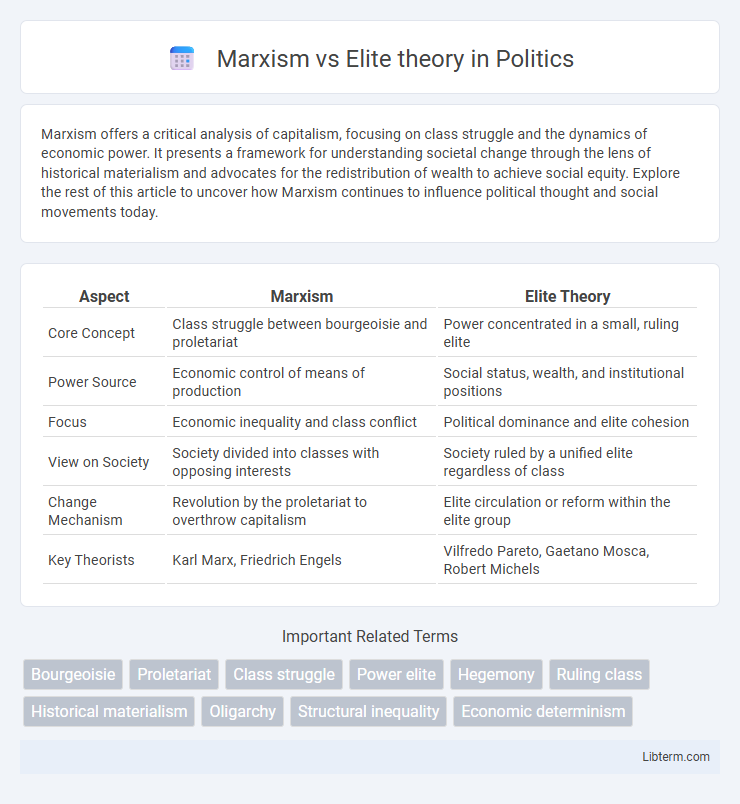Marxism offers a critical analysis of capitalism, focusing on class struggle and the dynamics of economic power. It presents a framework for understanding societal change through the lens of historical materialism and advocates for the redistribution of wealth to achieve social equity. Explore the rest of this article to uncover how Marxism continues to influence political thought and social movements today.
Table of Comparison
| Aspect | Marxism | Elite Theory |
|---|---|---|
| Core Concept | Class struggle between bourgeoisie and proletariat | Power concentrated in a small, ruling elite |
| Power Source | Economic control of means of production | Social status, wealth, and institutional positions |
| Focus | Economic inequality and class conflict | Political dominance and elite cohesion |
| View on Society | Society divided into classes with opposing interests | Society ruled by a unified elite regardless of class |
| Change Mechanism | Revolution by the proletariat to overthrow capitalism | Elite circulation or reform within the elite group |
| Key Theorists | Karl Marx, Friedrich Engels | Vilfredo Pareto, Gaetano Mosca, Robert Michels |
Introduction to Marxism and Elite Theory
Marxism centers on class struggle, emphasizing the conflict between the bourgeoisie, who control the means of production, and the proletariat, who sell their labor. Elite theory, by contrast, argues that a small, cohesive group of elites holds disproportionate power over society, regardless of class divisions. Both frameworks analyze power distribution but differ in their focus on economic class versus elite dominance.
Historical Origins and Philosophical Foundations
Marxism, rooted in the 19th-century works of Karl Marx and Friedrich Engels, emphasizes class struggle and economic determinism as drivers of societal change, advocating for a proletarian revolution to overthrow capitalist systems. Elite theory, emerging in the early 20th century through scholars like Vilfredo Pareto and Gaetano Mosca, posits that society is invariably governed by a small, cohesive elite regardless of political structures, focusing on power dynamics rather than economic class specifically. Philosophically, Marxism is grounded in dialectical materialism, analyzing history through material conditions and class relations, while elite theory is based on power distribution and sociological analysis of social hierarchies and leadership selection.
Core Principles of Marxism
Marxism centers on the conflict between the proletariat and bourgeoisie, emphasizing class struggle as the driving force of historical change and advocating for the abolition of capitalist exploitation through collective ownership of production. It posits that economic base determines the superstructure, shaping societal institutions and ideology to sustain ruling class dominance. Unlike Elite theory, which focuses on the power concentration in a small ruling group across sectors, Marxism highlights systemic economic inequalities and class consciousness as essential for revolutionary transformation.
Core Tenets of Elite Theory
Elite theory posits that society is governed by a small group of elites who hold concentrated power and make decisions that serve their interests, contrasting with Marxism's focus on class struggle between the proletariat and bourgeoisie. This theory emphasizes that elites maintain control through institutions, economic resources, and social networks, limiting mass influence on political outcomes. Elite theorists argue that democratic processes often mask elite dominance rather than enable true popular sovereignty.
Power Structures: Class vs. Elite Groups
Marxism centers on power structures defined by class struggle between the proletariat and bourgeoisie, emphasizing economic relations as the primary source of social conflict and control. Elite theory argues that power is concentrated in the hands of a small, cohesive group of elites who dominate political, economic, and social institutions regardless of class. Both perspectives highlight hierarchical power dynamics but diverge on whether class or elite groups are the fundamental agents of control.
Perspectives on Social Inequality
Marxism attributes social inequality to class conflict, emphasizing the exploitation of the proletariat by the bourgeoisie through control of the means of production. Elite theory views social inequality as arising from the concentration of power in the hands of a small, cohesive elite that dominates political, economic, and social institutions. While Marxism highlights systemic economic exploitation, elite theory focuses on power dynamics and the monopolization of influence by a ruling minority.
Political Implications and Governance Models
Marxism emphasizes class struggle and advocates for a proletariat-led revolution to establish a classless society, promoting collective ownership and centralized control to dismantle capitalist power structures. Elite theory argues that a small, cohesive elite controls political power regardless of democratic institutions, highlighting the persistence of hierarchical governance and limited power diffusion. Political implications of Marxism involve radical redistribution and systemic overhaul, while elite theory prompts scrutiny of power concentration and oligarchic rule within nominally democratic systems.
Criticisms and Limitations of Both Theories
Marxism faces criticism for its economic determinism and underestimation of political and cultural factors, often oversimplifying class structures and ignoring pluralistic power dynamics. Elite theory is limited by its assumption that a unified elite controls all power, neglecting internal conflicts and the influence of mass participation in decision-making processes. Both theories struggle to fully capture the complexity of modern societies, with Marxism criticized for its revolutionary prescriptions and Elite theory for potential elitism and lack of accountability mechanisms.
Contemporary Relevance and Applications
Marxism remains influential in analyzing class struggles and economic inequalities within contemporary capitalist societies, guiding movements advocating for workers' rights and wealth redistribution. Elite theory applies to modern political analysis by explaining how power concentrates within small, interconnected groups controlling economic and political institutions. Both frameworks inform debates on social justice, governance, and policy-making, highlighting structural dominance and the need for systemic change.
Comparative Analysis: Marxism vs. Elite Theory
Marxism centers on class conflict, emphasizing the proletariat's struggle against the bourgeois capitalist class, while Elite Theory posits that power is concentrated in the hands of a minority elite regardless of class divisions. Marxism interprets societal change as driven by economic forces and class relations, whereas Elite Theory focuses on the mechanisms through which a ruling elite maintains control across political, military, and economic institutions. Both frameworks analyze power distribution but diverge on the sources and dynamics of dominance within society.
Marxism Infographic

 libterm.com
libterm.com